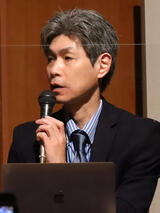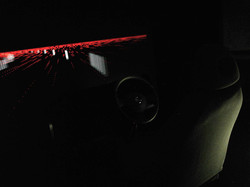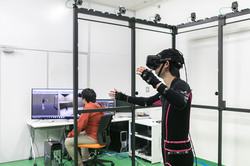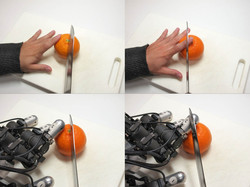
北崎 充晃(きたざき みちてる)
| 所属 | 情報・知能工学系 |
|---|---|
| 職名 | 教授 |
| 専門分野 | 知覚心理学 / 認知神経科学 / バーチャルリアリティ |
| 学位 | 博士(学術)(東京大学) |
| 所属学会 | 日本心理学会 / 日本バーチャルリアリティ学会 / 日本視覚学会 / 日本基礎心理学会 / Vision Sciences Society |
| mich@cs ※アドレスの末尾に「.tut.ac.jp」を補完してください |
|
| 研究室web | http://real.cs.tut.ac.jp/ |
| 研究者情報(researchmap) | 研究者情報 |
研究紹介
私たちが世界をどのように知覚し,他者とどのようなコミュニケーションをしているのかを科学的に解明しようとしています。私たちの知覚や社会性は,身体の形状やイメージ、内的感覚に強く規定されています。この知覚の身体性に着目し,運動する身体としての人の知覚の研究(Mobile Observerの科学),リアリティを科学的に解明し,操作・制御するための研究(身体リアリティの科学),そして実空間でもメタバースでも社会にとって重要な共感や公平性に関する認知機構や神経機構を解明する研究(潜在的社会性の科学)を行っています。今後,バーチャルリアリティやロボティクスによって私たちの身体や身体イメージが変わっていくことが予想されます。こうした身体の変化がどのような心の変化,行動の変化,社会の変化をもたらすかを研究し,適切な未来社会の設計に貢献したいと思っています。
テーマ1:Mobile Observerの科学
概要
人は視覚,前庭感覚,聴覚,触覚などさまざまな情報から自分自身の運動や位置,傾きを知覚して,それを行動に利用しています。車の運転は,まさにその究極の例です。そこで,視覚刺激や前庭刺激(電気前庭刺激),聴覚刺激,触覚刺激などを提示し,人の自己運動の知覚や姿勢制御を調べています。成人のみならず,子どもを対象とした知覚行動発達の研究も行っています。また。視覚心理物理実験に最適化したドライビングシミュレータを開発し,ステアリング操作における知覚・認知情報処理の解明と工学的応用を行っています。テレプレゼンスを利用したバーチャル歩行システムの開発と評価も行っています。
主な業績
Nakamura, J., and Kitazaki, M. (2024). The effect of posture on virtual walking experience using foot vibrations, Scientific Reports, 14:19366
Nakamura, J., Ikei, Y., and Kitazaki, M. (2024). Effects of foot vibration and self-avatar cast shadow on virtual walking sensations and cybersickness from omnidirectional movie. i-Perception,15(1):20416695241227857
Nakamura, J., Matsuda, Y., Amemiya, T., Ikei, Y., and Kitazaki, M. (2021). Virtual Walking with Omnidirectional Movies and Foot Vibrations: Scene-congruent Vibrations Enhance Walking-related Sensations and Ground Material Perceptions. IEEE Access, DOI: 10.1109/ACCESS.2021.3136557
Matsuda, Y., Nakamura, J., Amemiya, T., Ikei, Y., and Kitazaki, M. (2021). Enhancing Virtual Walking Sensation using Self-Avatar in First-person Perspective and Foot Vibrations, Frontiers in Virtual Reality, 2:654088
Matsuda, Y., Sugimoto, M., Inami, M., and Kitazaki, M. (2021). Peripersonal space in the front, rear, left and right directions for audio-tactile multisensory integration. Scientific Reports, 11:11303
Kitazaki, M., Hamada, T., Yoshiho, K., Kondo, R., Amemiya, T., Hirota, K., and Ikei, Y. (2019). Virtual walking sensation by pre-recorded oscillating optic flow and synchronous foot vibration. i-Perception, 10(5), 1–14. doi:10.1177/2041669519882448
Amemiya, T., Ikei, Y., and Kitazaki, M. (2019). Remapping peripersonal space by using foot sole vibrations without any body movement. Psychological Science, https://doi.org/10.1177/0956797619869337
Kitazaki, M. (2013), Effects of retinal position on visuo-motor adaptation of visual stability in a virtual environment, i-Perception, 4(4), 242-252.
Kawahara, J., Yanase, K., and Kitazaki, M. (2012), Attentional capture by the onset and offset of motion signals outside the spatial focus of attention, Journal of Vision, 12(12): 10.
Kitazaki, M. and Kimura, T. (2010), Effects of long-term adaptation to sway-yoked visual motion and galvanic vestibular stimulation on visual and vestibular control of posture, Presence: Teleoperators and Virtual Environments, 19(6), 544-556.
Kitazaki, M. and Sato, T. (2003), Attentional modulation of self-motion perception, Perception, 32, 475-484.
キーワード
テーマ2:身体リアリティの科学
概要
リアルと感じる瞬間はなぜそう感じるのでしょうか? 何をリアルと感じるのか,リアルとアンリアルの境界は何か。リアリティの源泉は私たち自身の身体にあります。リアルであることが知覚と行動にどのような影響を及ぼすのか,どのような身体にリアリティを感じるのか,身体を変えることで心と行動はどう変わるのかを調べ,リアリティの解明とリアリティ測定手法の研究を行っています。質感や美しさの知覚,身体認知,複合感覚統合,テレプレゼンス追体験,身体拡張などの研究を行っています。果たして我々の身体はどこまで変えることができ,どうしたらそれを自分の身体と感じることができ,それによって私たちの心や行動,コミュニケーションが変わるのかをターゲットに研究を行っています。
主な業績
Hapuarachchi, H., Ishimoto, H., Kitazaki, M., Sugimoto, M., Inami, M. (2023). Temporal visuomotor synchrony induces embodiment towards an avatar with biomechanically impossible arm movements, i-Perception, 14(6):20416695231211699
Katsumata, Y., Inoue, Y., Toriumi, S., Ishimoto, H., Hapuarachchi, H., and Kitazaki, M. (2023). Shared avatar for hand movement imitation: Subjective and behavioral analyses. IEEE Access, 11, 96710-96717.
Hapuarachchi, H., Hagiwara, T., Ganesh, G., and Kitazaki, M. (2023). Effect of connection induced upper body movements on embodiment towards a limb controlled by another during virtual co-embodiment. PLoS One, 18(1): e0278022
Hapuarachchi H., and Kitazaki, M. (2022). Knowing the intention behind limb movements of a partner increases embodiment towards the limb of joint avatar, Scientific Reports, 12:11453
Arai, K., Saito, H., Fukuoka, M., Ueda, S., Sugimoto, M., Kitazaki, M., and Inami, M. (2022). Embodiment of Supernumerary Robotic Limbs in Virtual Reality, Scientific Reports, 12: 9769
Miura, R., Kasahara, S., Kitazaki, M., Verhulst, A., Inami, M., and Sugimoto, M. (2022). MultiSoma: Motor and Gaze Analysis on Distributed Embodiment with Synchronized Behavior and Perception. Frontiers in Computer Science, 4:788014
Hagiwara, T., Ganesh, Sugimoto, M., Inami, M., and Kitazaki, M. (2020) Individuals prioritize the reach straightness and hand jerk of a shared avatar over their own, iScience, 23(12): 101732
Kondo, R., Tani, Y., Sugimoto, M., Inami, M., and Kitazaki, M. (2020). Scrambled body differentiates body part ownership from the full body illusion. Scientific Reports, 10:5274,
Kondo, R., Tani, Y., Sugimoto, M., Minamizawa, K., Inami, M., and Kitazaki, M. (2020). Re-association of Body Parts: Illusory Ownership of a Virtual Arm Associated with the Contralateral Real Finger by Visuo-motor Synchrony. Frontiers in Robotics and AI: Virtual Environments, 7:26.
Kondo, R., Sugimoto, M., Minamizawa, K., Hoshi, T., Inami, M., and Kitazaki, M. (2018). Illusory body ownership of an invisible body interpolated between virtual hands and feet via visual-motor synchronicity, Scientific Reports, 8:7541
キーワード
テーマ3:潜在的社会性の科学
概要
私たちは知らず知らずのうちに他者とコミュニケーションをしており,社会的コミュニケーションに基づいた知覚を潜在的に行っています。そこで媒介となっているのは身体です。この身体から生じる潜在的社会性に関して,身体知覚,共感の認知神経科学,公平感の認知神経科学の研究を行っています。前言語期の乳児が原始的な同情を示すことや人はロボットにも共感を示すことを行動実験や脳波計測実験で示しました。実空間のみならず急速に普及しているメタバースでの社会性について研究を進めています。
主な業績
Hapuarachchi, H., Higashihata, K., Sugiura, M., Sato, A., Itakura, S., and Kitazaki, M. (2023). Empathic embarrassment towards non-human agents in virtual environments, Scientific Reports, 13: 13914
Sato, A., Matsuo, A., and Kitazaki, M. (2019). Social contingency modulates the perceived distance between self and other. Cognition, 192, 1-5. doi: 10.1016/j.cognition.2019.06.018
Kenward, B., Berggren, M., Kitazaki, M., Itakura, S., and Kanakogi, Y. (2018). Implicit social associations for geometric shape agents more strongly influenced by visual form than by explicitly identified social actions. Psychologia, 61(1), 37-52
Ishikawa, M., Park, Y-h., Kitazaki, M., and Itakura, S. (2017). Social information affects adults’ evaluation of fairness in distributions: An ERP approach. PLoS ONE, 12(2): e0172974
Suzuki, Y., Galli, L., Ikeda, A., Itakura, S. and Kitazaki, M. (2015). Measuring empathy for human and robot hand pain using electroencephalography. Scientific Reports, 5:15924
Kanakogi, Y., Okumura, Y., Inoue, Y., Kitazaki, M., and Itakura, S. (2013), Rudimentary sympathy in preverbal infants: Preference for others in distress, PLOS ONE, 8(6): e65292.
キーワード
担当授業科目名(科目コード)
認知科学序論 / ヒューマン情報処理 / X Reality and Psychology |
その他(受賞、学会役員等)
受賞等:
日本バーチャルリアリティ学会論文賞(2006年,2010年,2014年,2017年)
JVRC2009 (2009 Joint Virtual Reality Conference of EGVE - ICAT - EuroVR) Best Paper Award Honorable Mention(2009年)
日本基礎心理学会優秀論文賞(2014年,2018年)
日本バーチャルリアリティ学会貢献賞(2016年)
Best demo award of Augmented Human 2017
SIGGRAPH Asia 2018 Best Virtual Reality and Augmented Reality Award (2018年)
Scientific Reports Top 100 in Neuroscience 2018 (2019)
Augmented Humans 2021, Best Paper Award
Augmented Humans 2022, Best Paper Award Honorable Mention
学会役員等:
日本視覚学会幹事(2018年-),日本視覚学会世話人(2004-2017年),日本視覚学会2007年夏季大会実行委員長
日本基礎心理学会理事(2015年-),日本基礎心理学会編集委員(2012年-2017年),日本基礎心理学会第42回大会準備委員会委員長(2023年)
日本心理学会専門別議員(2005年-2022年)、日本心理学会地域別議員(2023年-)
日本バーチャルリアリティ学会VR心理学研究委員会委員長(2009-2011),日本バーチャルリアリティ学会理事(2011-2014年、2021-2024年),日本バーチャルリアリティ学会評議員(2015-2020年、2025年-),日本バーチャルリアリティ学会拡張認知インタフェース調査委員会委員長(2018年-)
内閣府 上席科学技術政策フェロー(2016年)




